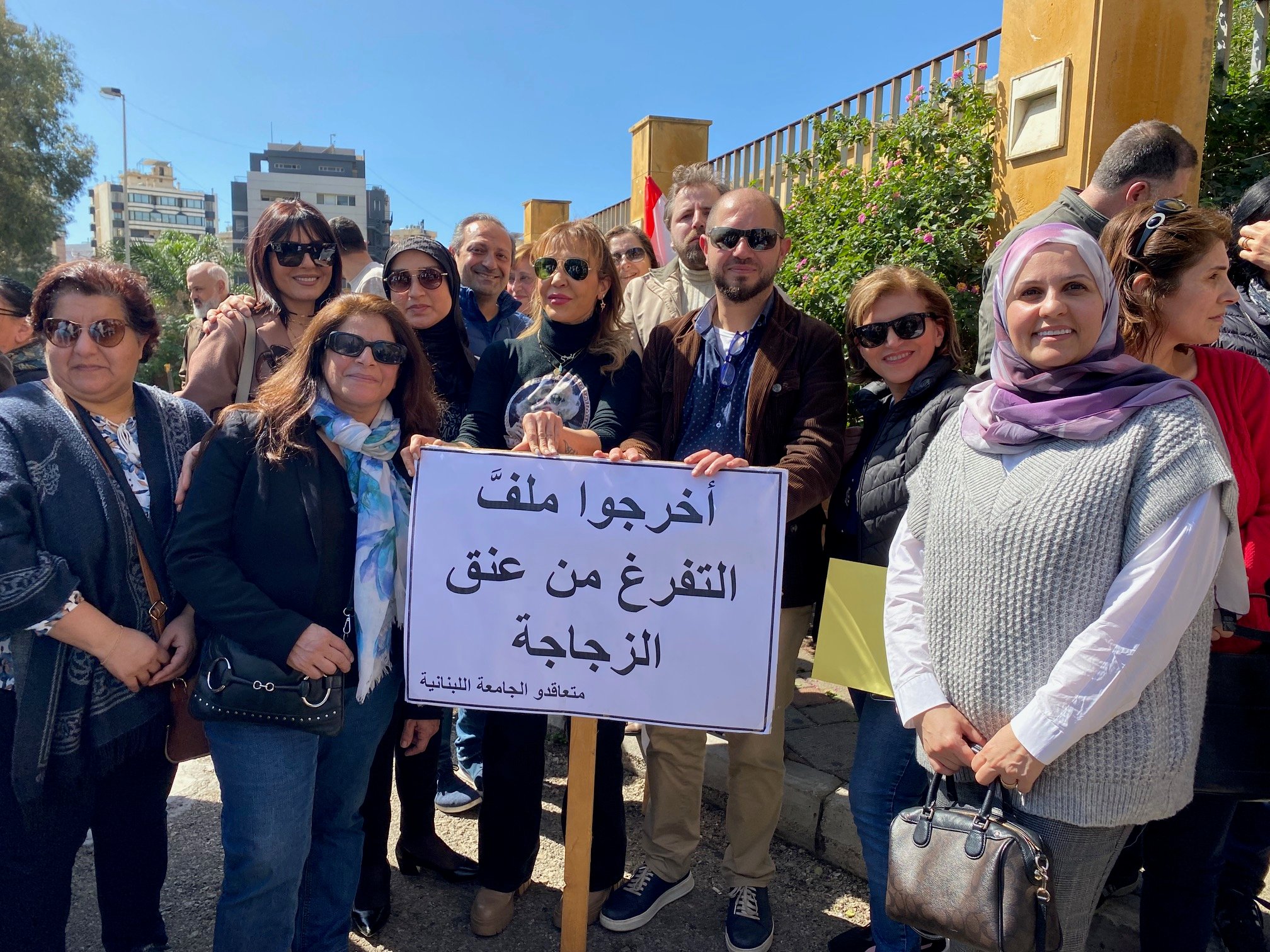
In front of the Ministry of Education and Higher Education, the UL's hourly temporary teachers.Photo AMH/L'Olj
BEIRUT — A few hundred professors on hourly-paid contracts with the Lebanese University staged a sit-in on Tuesday in front of Ministry of Education and Higher Education headquarters in Beirut, to demand the status of "full-time part-timers," an intermediary between their current status and that of regular teachers.
The initiative, led by LU's Committee of Contractual Hourly Teachers, accompanies a week-long warning strike, which followed two weeks of interrupted classes and exam marking. On Monday, the committee threatened a full-fledged strike if their demands are not met.
The issue does not seem likely to be resolved any time soon. The advancement of LU professors has been hampered since 2014 by questions of community balance.
The two-dollar hour
Placards brandished by the demonstrators display the demands of teachers who are fed up with being "humiliated" by the state: "The hour of a university professor is only worth two dollars, a disgrace!" "Our children have a right to stability," "Where are our usurped salaries?" or "Yes to the full treatment of the file of full-time part-timers."
"We have no rights," says Zouheir Bachnak, a law professor with nine years' seniority. "Not only is our hourly wage only worth two dollars [since the collapse of the Lebanese pound, which trades at 89,500 to the dollar, compared with 1,500 LL to the dollar before October 2019], but we have no health cover, no affiliation to the National Social Security Fund, not even transport or attendance allowances, or even social assistance. The icing on the cake is that we still haven't been paid for 2022-2023."
The hourly wage of these contract employees, considered as second and third category civil servants, varies between LL65,000 and LL300,000. It is paid once a year.
"We've been teaching for free for over three years now," says Hamda Farhat, a psychology teacher of 14 years.
Sana' Chehayeb, a math teacher from Aley told L'Orient-Le Jour, "In the year 2020-2021, I only received the equivalent of $100 for 160 hours of university teaching."
When asked why the two dedicated teachers have waited so long to express their frustration, they simply reply that they "can't take it anymore."
1,760 eligible for full-time work
At the heart of the movement, are the voices of those expressing long-suppressed anger. "We won't be teaching on Monday, you can be sure of that," shouts one teacher. "Do you realize that if we don't have other jobs, it's impossible to support our families? We're simply exhausted," shouts another.
Bassam Badran, rector of the Lebanese University, explained to L'Orient-Le Jour that the university has 3,000 hourly contract professors, 1,760 of whom are eligible for full-time part-time status, as they have a doctorate and the required seniority — at least two years, with 200 hours of teaching per year. With 63,000 students, the country's only public university also has 1,600 professors.
"Professors paid by the hour are victims of injustice," Badran says, asserting that he has worked hard on the issue, which is now in the hands of Minister Abbas Halabi. Successive crises have shaken Lebanon financially, politically, and with regards to health and security. Many teachers have left the country as a result, leading to significant "brain drain."
"Given the number of defections, the lists had to be updated," explains the rector. So, in the meantime, "measures could be taken quickly to improve the salary conditions of the protesters, in particular an increase in the hourly wage, the monthly payment of salaries and finally payment for the year 2022-2023."
 "Take out the bottle of the bottleneck," said this sign carried by protest teachers.Photo AMH/L'Olj
"Take out the bottle of the bottleneck," said this sign carried by protest teachers.Photo AMH/L'Olj
But progress is hindered by the denominational balance that the political class insists on respecting, according to a source speaking on condition of anonymity. The number of Shi'ite contract workers applying for full-time positions far outnumbers candidates from other communities, the source says. Similarly, the number of Muslim candidates far exceeds the number of Christian candidates.
Of the 1,760 full-time contract employees, 670 are Shi'ite, 480 are Sunni, 530 are Christian and only 60 are Druze. "Respecting the confessional balance would mean that a significant proportion of Shi'ite candidates would be rejected, which is already provoking a negative response from the Shi'ite Amal-Hezbollah duo and religious authorities," the source explained.
"We're not first-class civil servants, so community parity doesn't apply to us," says Antoine Awad, professor of architecture at Hadeth LU.
"We're calling for full-time contract employees to be selected on merit," adds his colleague Nada Fakih.
"Because I'm Shi'ite, I've been excluded from full-time employment," Hamda Farhat says.
But none of this is new, as the LU has been suffering the full brunt of political and sectarian intervention for decades, to the detriment of its independence.
The next move belongs to the Ministry of Education, whose doors have remained closed. The ministry's inaction threatens to hamper the functioning capacity of the country's only public university.